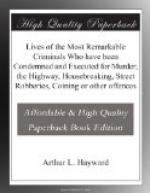Afterwards they went up and down Hertfordshire, but got scarce money enough to bear their expenses; but where there were small gettings they lived the more frugally, for Doyle observed that if the country did not bear their expenses wherever he travelled, he thought it very hard, and that if he failed of gaming one day, he commonly got as much the next as he could well destroy.
Hitherto we have kept very close to those memoirs which Mr. Doyle left behind him, which I did with this view, that my readers might have some idea of what these people think of themselves. I shall now bring you to the conclusion of his story, by informing you that finding himself beset at the several lodgings which he kept by way of precaution, he for some days behaved himself with much circumspection; but happening to forget his pistols, he was seized, coming out of an inn in Drury Lane, and though he made as much resistance as he was able, yet they forced him unto a coach and conveyed him to Newgate. It is hard to say what expectations he entertained after he was once apprehended, but it is reasonable to believe that he had strong hopes of life, notwithstanding his pleading guilty at his trial, for he dissembled until the time of the coming down of a death warrant, and then declared he was a Roman Catholic, and not a member of the Church of England, as he had hitherto pretended.
He seemed to be a tolerably good-natured man, but excessively vicious at the same time that he was extravagantly fond of the woman he called his wife. He took no little pleasure in the relations of those adventures which happened to him in his exploits on the highway, and expressed himself with much seeming satisfaction, because as he said, he had never been guilty of beating or using passengers ill, much less of wounding or attempting to murder them. In general terms, he pretended to much penitence, but whether it was that he could not get over the natural vivacity of his own temper, or that the principles of the Church of Rome, as is too common a case, proved a strong opiate in his conscience, however it was, I say, Doyle did not seem to have any true contrition for his great and manifold offences. On the contrary, he appeared with some levity, even when on the very point of death.
He went to execution in a mourning coach; all the way he read with much seeming attention in a little Popish manual, which had been given him by one of his friends. At the tree he spoke a little to the people, told them that his wife had been a very good wife to him, let her character in other respects be what it would. Then he declared he had left behind him memoirs of his life and conduct, to which he had nothing to add there, and from which I have taken verbatim a great part of what I have related. And then, having nothing more to offer to the world, he submitted to death on the first of June, 1730, but in what year of his age I cannot say.
However, before I make an end of what relates to Mr. Doyle, it would be proper to acquaint the public that the vanity of his wife extended so far as to make a pompous funeral for him at St. Sepulchre’s church, whereat she, as chief mourner assisted, and was led by a gentleman whom the world suspected to be of her husband’s employment.




